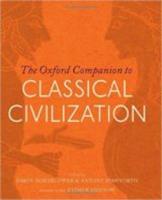
OUP (2014) h/b 867pp £40 (ISBN 9780198706779)
The Oxford Classical Dictionary (OCD1) was first published in 1949, and OCD2 came out in 1970, both biased towards the literary, with many of the entries barely changed between the two editions. In an era blessed with major scholarly advance across many fields, if somewhat deranged by theory in the process, it was soon out of date, and in 1996 a much needed OCD3 emerged, reworking completely almost all the old entries, expanding its scope beyond the mainly literary to include broader, more interdisciplinary and thematic studies (sexuality, the Near East, anthropology, economics, technology, etc.) and ensuring most entries were accessible to those without the languages. It was a great success. A lightly revised version came out in 2003, and in 2012 OCD4 all entries were revisited and updated where necessary, and a further tranche of new topics added (now c. 6,700 in all, about 1,500 more than in OCD1).
The OCD is not exactly pocket-sized, however, and the book under review—the Oxford Companion to Classical Civilisation—was first published in 1998 to offer a smaller version. This did not mean cutting down the entries, but selecting the most important ones, and adding a visual element as well. OCCC2 follows the same practice, but taking its entries from OCD4 .
Of course, one will quibble about omissions. I was surprised, for example, to find no entry for Theophrastus, Aristotle’s brilliant successor at the Lyceum and the inventor of botany. One small warning: the really major entries, indicated by marginal markings, are always started at the head of a page and can interrupt the other entries. Thus the entry on Callimachus, beginning on p. 140, is interrupted on p. 142 by a major entry on Julius Caesar, and resumes on p. 146. One improvement: OCD’s irritating practice of citing Roman names by the middle name (the nomen: so look under Iulius for Caesar, Tullius for Cicero etc.) does not apply.
In all, it is a first-rate production, on satisfactorily heavy paper and beautifully illustrated, and at £40 a must-have for the non-specialist (OCD4 costs £105). The editors are to be heartily congratulated on the whole operation. Meanwhile, Oxford is working on an online version, to be regularly updated. Watch this space.
Peter Jones
